- By theme
- Jesus
- The many proofs of Christ’s resurrection
- Saint Thomas Aquinas: God gave all the divine proofs we needed to believe
- The surpassing power of Christ's word
- Lewis’s trilemma: a proof of Jesus’s divinity
- God saves: the power of the holy name of Jesus
- Jesus spoke and acted as God's equal
- Jesus' divinity is actually implied in the Koran
- Jesus came at the perfect time of history
- Rabbinical sources testify to Jesus' miracles
- Mary
- The Church
- The Bible
- The authors of the Gospels were either eyewitnesses or close contacts of those eyewitnesses
- Onomastics support the historical reliability of the Gospels
- The New Testament was not altered
- The New Testament is the best-attested manuscript of Antiquity
- The Gospels were written too early after the facts to be legends
- Archaeological finds confirm the reliability of the New Testament
- The criterion of embarrassment proves that the Gospels tell the truth
- The dissimilarity criterion strengthens the case for the historical reliability of the Gospels
- 84 details in Acts verified by historical and archaeological sources
- The unique prophecies that announced the Messiah
- The time of the coming of the Messiah was accurately prophesied
- The prophet Isaiah's ultra accurate description of the Messiah's sufferings
- Daniel's "Son of Man" is a portrait of Christ
- The Apostles
- The martyrs
- The protomartyr Saint Stephen (d. 31)
- Polycarp, bishop of Smyrna, disciple of John and martyr (d. 155)
- Saint Blandina and the Martyrs of Lyon: the fortitude of faith (177 AD)
- Saint Agatha stops a volcano from destroying the city of Catania (d. 251)
- Saint Lucy of Syracuse, virgin and martyr for Christ (d. 304)
- Thomas More: “The king’s good servant, but God’s first”
- The martyrdom of Paul Miki and his companions (d. 1597)
- The martyrs of Angers and Avrillé (1794)
- The Martyrs of Compiègne (1794)
- The Vietnamese martyrs Father Andrew Dung-Lac and his 116 companions (17th-19th centuries)
- He braved torture to atone for his apostasy (d. 1818)
- Blaise Marmoiton: the epic journey of a missionary to New Caledonia (d. 1847)
- José Luis Sanchez del Rio, martyred at age 14 for Christ the King (d. 1928)
- Saint Maximilian Kolbe, Knight of the Immaculate (d. 1941)
- The monks
- Saint Anthony of the Desert, a father of monasticism (d. 356)
- Saint Benedict, father of Western monasticism (d. 550)
- Saint Bruno the Carthusian (d.1101): the miracle of a hidden life
- Blessed Angelo Agostini Mazzinghi: the Carmelite with flowers pouring from his mouth (d. 1438)
- Monk Abel of Valaam's accurate prophecies about Russia (d. 1841)
- The more than 33,000 miracles of Saint Charbel Maklouf (d. 1898)
- Saint Pio of Pietrelcina (d. 1968): How God worked wonders through "a poor brother who prays"
- The surprising death of Father Emmanuel de Floris (d. 1992)
- The prophecies of Saint Paisios of Mount Athos (d. 1994)
- The saints
- Saints Anne and Joachim, parents of the Virgin Mary (19 BC)
- Saint Nazarius, apostle and martyr (d. 68 or 70)
- Ignatius of Antioch: successor of the apostles and witness to the Gospel (d. 117)
- Saint Gregory the Miracle-Worker (d. 270)
- Saint Martin of Tours: patron saint of France, father of monasticism in Gaul, and the first great leader of Western monasticism (d. 397)
- Saint Lupus, the bishop who saved his city from the Huns (d. 623)
- Saint Dominic of Guzman (d.1221): an athlete of the faith
- Saint Francis, the poor man of Assisi (d. 1226)
- Saint Anthony of Padua: "everyone’s saint"
- Saint Rose of Viterbo or How prayer can transform the world (d. 1252)
- Saint Simon Stock receives the scapular of Mount Carmel from the hands of the Virgin Mary
- The unusual boat of Saint Basil of Ryazan
- Saint Agnes of Montepulciano's complete God-confidence (d. 1317)
- The extraordinary conversion of Michelina of Pesaro
- Saint Peter Thomas (d. 1366): a steadfast trust in the Virgin Mary
- Saint Rita of Cascia: hoping against all hope
- Saint Catherine of Genoa and the Fire of God's love (d. 1510)
- Saint Anthony Mary Zaccaria, physician of bodies and souls (d. 1539)
- Saint Ignatius of Loyola (d. 1556): "For the greater glory of God"
- Brother Alphonsus Rodríguez, SJ: the "holy porter" (d. 1617)
- Martin de Porres returns to speed up his beatification (d. 1639)
- Virginia Centurione Bracelli: When God is the only goal, all difficulties are overcome (d.1651)
- Seraphim of Sarov (1759-1833): the purpose of the Christian life is to acquire the Holy Spirit
- Bernadette Soubirous, the shepherdess who saw the Virgin Mary (1858)
- Saint John Vianney (d. 1859): the global fame of a humble village priest
- Gabriel of Our Lady of Sorrows, the "Gardener of the Blessed Virgin" (d. 1862)
- Father Gerin, the holy priest of Grenoble (1863)
- Blessed Francisco Palau y Quer: a lover of the Church (d. 1872)
- Saints Louis and Zelie Martin, the parents of Saint Therese of Lisieux (d. 1894 and 1877)
- The supernatural maturity of Francisco Marto, “contemplative consoler of God” (d. 1919)
- Saint Faustina, apostle of the Divine Mercy (d. 1938)
- Brother Marcel Van (d.19659): a "star has risen in the East"
- Doctors
- The mystics
- Lutgardis of Tongeren and the devotion to the Sacred Heart
- Saint Angela of Foligno (d. 1309) and "Lady Poverty"
- Saint John of the Cross: mystic, reformer, poet, and universal psychologist (+1591)
- Blessed Anne of Jesus: a Carmelite nun with mystical gifts (d.1621)
- Catherine Daniélou: a mystical bride of Christ in Brittany
- Saint Margaret Mary sees the "Heart that so loved mankind"
- Mother Yvonne-Aimée of Jesus' predictions concerning the Second World War (1922)
- Sister Josefa Menendez, apostle of divine mercy (d. 1923)
- Edith Royer (d. 1924) and the Sacred Heart Basilica of Montmartre
- Rozalia Celak, a mystic with a very special mission (d. 1944)
- Visionaries
- Saint Perpetua delivers her brother from Purgatory (203)
- María de Jesús de Ágreda, abbess and friend of the King of Spain
- Discovery of the Virgin Mary's house in Ephesus (1891)
- Sister Benigna Consolata: the "Little Secretary of Merciful Love" (d. 1916)
- Maria Valtorta's visions match data from the Israel Meteorological Service (1943)
- Berthe Petit's prophecies about the two world wars (d. 1943)
- Maria Valtorta saw only one pyramid at Giza in her visions... and she was right! (1944)
- The 700 extraordinary visions of the Gospel received by Maria Valtorta (d. 1961)
- The amazing geological accuracy of Maria Valtorta's writings (d. 1961)
- Maria Valtorta's astronomic observations consistent with her dating system
- Discovery of an ancient princely house in Jerusalem, previously revealed to a mystic (d. 1961)
- The popes
- The great witnesses of the faith
- Saint Augustine's conversion: "Why not this very hour make an end to my uncleanness?" (386)
- Thomas Cajetan (d. 1534): a life in service of the truth
- Madame Acarie, "the servant of the servants of God" (d. 1618)
- Blaise Pascal (d.1662): Biblical prophecies are evidence
- Jacinta, 10, offers her suffering to save souls from hell (d. 1920)
- Father Jean-Édouard Lamy: "another Curé of Ars" (d. 1931)
- Christian civilisation
- The depth of Christian spirituality
- John of the Cross' Path to perfect union with God based on his own experience
- The dogma of the Trinity: an increasingly better understood truth
- The incoherent arguments against Christianity
- The "New Pentecost": modern day, spectacular outpouring of the Holy Spirit
- The Christian faith explains the diversity of religions
- Cardinal Pierre de Bérulle (d.1629) on the mystery of the Incarnation
- Christ's interventions in history
- Marian apparitions and interventions
- The Life-giving Font of Constantinople
- Our Lady of Virtues saves the city of Rennes in Bretagne (1357)
- Mary stops the plague epidemic at Mount Berico (1426)
- Cotignac: the first apparitions of the Modern Era (1519)
- Savona: supernatural origin of the devotion to Our Lady of Mercy (1536)
- The Virgin Mary delivers besieged Christians in Cusco, Peru
- The victory of Lepanto and the feast of Our Lady of the Rosary (1571)
- The apparitions to Brother Fiacre (1637)
- The “aldermen's vow”, or the Marian devotion of the people of Lyon (1643)
- Our Lady of Nazareth in Plancoët, Brittany (1644)
- Our Lady of Laghet (1652)
- Saint Joseph’s apparitions in Cotignac, France (1660)
- Heaven confides in a shepherdess of Le Laus (1664-1718)
- Zeitoun, a two-year miracle (1968-1970)
- The Holy Name of Mary and the major victory of Vienna (1683)
- Heaven and earth meet in Colombia: the Las Lajas shrine (1754)
- "Consecrate your parish to the Immaculate Heart of Mary" (1836)
- At La Salette, Mary wept in front of the shepherds (1846)
- Our Lady of Champion, Wisconsin: the first and only approved apparition of Mary in the US (1859)
- Gietrzwald apparitions: heavenly help to a persecuted minority
- The silent apparition of Knock Mhuire in Ireland (1879)
- Mary "Abandoned Mother" appears in a working-class district of Lyon, France (1882)
- The thirty-three apparitions of the Virgin Mary in Beauraing (1932)
- "Our Lady of the Poor" appears eight times in Banneux (1933)
- Fontanelle-Montichiari apparitions of Our Lady "Rosa Mystica" (1947)
- Zeitoun apparitions
- The Virgin Mary comes to France's rescue by appearing at L'Ile Bouchard (1947)
- Maria Esperanza Bianchini and Mary, Mary, Reconciler of Peoples and Nations (1976)
- Luz Amparo and the El Escorial apparitions
- The extraordinary apparitions of Medjugorje and their worldwide impact
- The Virgin Mary prophesied the 1994 Rwandan genocide (1981)
- Our Lady of Soufanieh's apparition and messages to Myrna Nazzour (1982)
- The Virgin Mary heals a teenager, then appears to him dozens of times (1986)
- Seuca, Romania: apparitions and pleas of the Virgin Mary, "Queen of Light" (1995)
- Angels and their manifestations
- Mont Saint-Michel: Heaven watching over France
- Angels give a supernatural belt to the chaste Thomas Aquinas (1243)
- The constant presence of demons and angels in the life of St Frances of Rome (d. 1440)
- Mother Yvonne-Aimée escapes from prison with the help of an angel (1943)
- Saved by Angels: The Miracle on Highway 6 (2008)
- Exorcisms in the name of Christ
- A wave of charity unique in the world
- Saint Angela Merici: Christ came to serve, not to be served (d. 1540)
- Saint John of God: a life dedicated to the care of the poor, sick and those with mental disorders (d. 1550)
- Saint Camillus de Lellis, reformer of hospital care (c. 1560)
- Blessed Alix Le Clerc, encouraged by the Virgin Mary to found schools (d. 1622)
- Saint Vincent de Paul (d. 1660), apostle of charity
- Marguerite Bourgeoys, Montreal's first teacher (d. 1700)
- Frédéric Ozanam, inventor of the Church's social doctrine (d. 1853)
- Damian of Molokai: a leper for Christ (d. 1889)
- Pier Giorgio Frassati (d.1925): heroic charity
- Saint Dulce of the Poor, the Good Angel of Bahia (d. 1992)
- Mother Teresa of Calcutta (d. 1997): an unshakeable faith
- Heidi Baker: Bringing God's love to the poor and forgotten of the world
- Amazing miracles
- The miracles of Saint Anthony of Padua (d. 1231)
- Saint Philip Neri calls a teenager back to life (1583)
- Saint Francis de Sales brings back to life a victim of drowning (1623)
- Saint John Bosco and the promise kept beyond the grave (1839)
- The day the sun danced at Fatima (1917)
- Pius XII and the miracle of the sun at the Vatican (1950)
- When Blessed Charles de Foucauld saved a young carpenter named Charle (2016)
- Reinhard Bonnke: 89 million conversions (d. 2019)
- Miraculous cures
- The royal touch: the divine thaumaturgic gift granted to French and English monarchs (11th-19th centuries)
- With 7,500 cases of unexplained cures, Lourdes is unique in the world (1858-today)
- Our Lady at Pellevoisin: "I am all merciful" (1876)
- Mariam, the "little thing of Jesus": a saint from East to West (d.1878)
- Gemma Galgani: healed to atone for sinners' faults (d. 1903)
- The miraculous cure of Blessed Maria Giuseppina Catanea
- The extraordinary healing of Alice Benlian in the Church of the Holy Cross in Damascus (1983)
- The approved miracle for the canonization of Juan Diego Cuauhtlatoatzin (1990)
- Healed by St Charbel Makhlouf, her scars bleed each month for the benefit of unbelievers (1993)
- The miracle that led to Brother André's canonisation (1999)
- Bruce Van Natta's intestinal regrowth: an irrefutable miracle (2007)
- Manouchak, operated on by Saint Charbel (2016)
- How Maya was cured from cancer at Saint Charbel's tomb (2018)
- Preserved bodies of the saints
- Dying in the odour of sanctity
- The body of Saint Cecilia found incorrupt (d. 230)
- Stanislaus Kostka's burning love for God (d. 1568)
- Blessed Antonio Franco, bishop and defender of the poor (d. 1626)
- The incorrupt body of Marie-Louise Nerbollier, the visionary from Diémoz (d. 1910)
- The great exhumation of Saint Charbel (1950)
- Bilocations
- Inedias
- Levitations
- Lacrimations and miraculous images
- Saint Juan Diego's tilma (1531)
- The Rue du Bac apparitions of the Virgin Mary to St. Catherine Labouré (Paris, 1830)
- Mary weeps in Syracuse (1953)
- Teresa Musco (d.1976): salvation through the Cross
- Soufanieh: A flow of oil from an image of the Virgin Mary, and oozing of oil from the face and hands of Myrna Nazzour (1982)
- The Saidnaya icon exudes a wonderful fragrance (1988)
- Our Lady weeps in a bishop's hands (1995)
- Stigmates
- The venerable Lukarda of Oberweimar shares her spiritual riches with her convent (d. 1309)
- Blessed Maria Grazia Tarallo, mystic and stigmatist (d. 1912)
- Saint Padre Pio: crucified by Love (1918)
- Elena Aiello: "a Eucharistic soul"
- A Holy Triduum with a Syrian mystic, witnessing the sufferings of Christ (1987)
- A Holy Thursday in Soufanieh (2004)
- Eucharistic miracles
- Lanciano: the first and possibly the greatest Eucharistic miracle (750)
- A host came to her: 11-year-old Imelda received Communion and died in ecstasy (1333)
- Faverney's hosts miraculously saved from fire
- A tsunami recedes before the Blessed Sacrament (1906)
- Buenos Aires miraculous host sent to forensic lab, found to be heart muscle (1996)
- Relics
- The Veil of Veronica, known as the Manoppello Image
- For centuries, the Shroud of Turin was the only negative image in the world
- The Holy Tunic of Argenteuil's fascinating history
- Saint Louis (d. 1270) and the relics of the Passion
- The miraculous rescue of the Shroud of Turin (1997)
- A comparative study of the blood present in Christ's relics
- Jews discover the Messiah
- Francis Xavier Samson Libermann, Jewish convert to Catholicism (1824)
- Our Lady of the Miraculous Medal and the conversion of Alphonse Ratisbonne (1842)
- Max Jacob: a liberal gay Jewish artist converts to Catholicism (1909)
- Edith Stein - Saint Benedicta of the Cross: "A daughter of Israel who, during the Nazi persecutions, remained united with faith and love to the Crucified Lord, Jesus Christ, as a Catholic, and to her people as a Jew"
- Patrick Elcabache: a Jew discovers the Messiah after his mother is miraculously cured in the name of Jesus
- Cardinal Aron Jean-Marie Lustiger (d. 2007): Chosen by God
- Muslim conversions
- Buddhist conversions
- Atheist conversions
- The conversion of an executioner during the Terror (1830)
- God woos a poet's heart: the story of Paul Claudel's conversion (1886)
- Dazzled by God: Madeleine Delbrêl's story (1924)
- C.S. Lewis, the reluctant convert (1931)
- The day André Frossard met Christ in Paris (1935)
- MC Solaar's rapper converts after experiencing Jesus' pains on the cross
- Father Sébastien Brière, converted at Medjugorje (2003)
- Franca Sozzani, the "Pope of fashion" who wanted to meet the Pope (2016)
- Nelly Gillant: from Reiki Master to Disciple of Christ (2018)
- Testimonies of encounters with Christ
- Near-death experiences (NDEs) confirm Catholic doctrine on the Four Last Things
- The NDE of Saint Christina the Astonishing, a source of conversion to Christ (1170)
- Jesus audibly calls Alphonsus Liguori to follow him (1723)
- Blessed Dina Bélanger (d. 1929): loving God and letting Jesus and Mary do their job
- Gabrielle Bossis: He and I
- André Levet's conversion in prison
- Journey between heaven and hell: a "near-death experience" (1971)
- Alicja Lenczewska: conversations with Jesus (1985)
- Vassula Ryden and the "True Life in God" (1985)
- Nahed Mahmoud Metwalli: from persecutor to persecuted (1987)
- The Bible verse that converted a young Algerian named Elie (2000)
- Invited to the celestial court: the story of Chantal (2017)
- Providential stories
- The superhuman intuition of Saint Pachomius the Great
- Germanus of Auxerre's prophecy about Saint Genevieve's future mission, and protection of the young woman (446)
- Seven golden stars reveal the future location of the Grande Chartreuse Monastery (1132)
- The supernatural reconciliation of the Duke of Aquitaine (1134)
- Joan of Arc: "the most beautiful story in the world"
- John of Capistrano saves the Church and Europe (1456)
- A celestial music comforts Elisabetta Picenardi on her deathbed (d. 1468)
- Gury of Kazan: freed from his prison by a "great light" (1520)
- The strange adventure of Yves Nicolazic (1623)
- Julien Maunoir miraculously learns Breton (1626)
- Pierre de Keriolet: with Mary, one cannot be lost (1636)
- How Korea evangelized itself (18th century)
- The prophetic poem about John Paul II (1840)
- Don Bosco's angel dog: Grigio (1854)
- Thérèse of Lisieux saved countless soldiers during the Great War
- Lost for over a century, a Russian icon reappears (1930)
- In 1947, a rosary crusade liberated Austria from the Soviets (1946-1955)
- The discovery of the tomb of Saint Peter in Rome (1949)
- He should have died of hypothermia in Soviet jails (1972)
- God protects a secret agent (1975)
- Flowing lava stops at church doors (1977)
- A protective hand saved John Paul II and led to happy consequences (1981)
- Mary Undoer of Knots: Pope Francis' gift to the world (1986)
- Edmond Fricoteaux's providential discovery of the statue of Our Lady of France (1988)
- The Virgin Mary frees a Vietnamese bishop from prison (1988)
- The miracles of Saint Juliana of Nicomedia (1994)
- Global launch of "Pilgrim Virgins" was made possible by God's Providence (1996)
- Syrian Monastery shielded from danger multiple times (2011-2020)
- Jesus
- Who are we?
- Make a donation
< Toutes les raisons sont ici !

TOUTES LES RAISONS DE CROIRE
- Jesus
- The many proofs of Christ’s resurrection
- Saint Thomas Aquinas: God gave all the divine proofs we needed to believe
- The surpassing power of Christ's word
- Lewis’s trilemma: a proof of Jesus’s divinity
- God saves: the power of the holy name of Jesus
- Jesus spoke and acted as God's equal
- Jesus' divinity is actually implied in the Koran
- Jesus came at the perfect time of history
- Rabbinical sources testify to Jesus' miracles
- Mary
- The Church
- The Bible
- The authors of the Gospels were either eyewitnesses or close contacts of those eyewitnesses
- Onomastics support the historical reliability of the Gospels
- The New Testament was not altered
- The New Testament is the best-attested manuscript of Antiquity
- The Gospels were written too early after the facts to be legends
- Archaeological finds confirm the reliability of the New Testament
- The criterion of embarrassment proves that the Gospels tell the truth
- The dissimilarity criterion strengthens the case for the historical reliability of the Gospels
- 84 details in Acts verified by historical and archaeological sources
- The unique prophecies that announced the Messiah
- The time of the coming of the Messiah was accurately prophesied
- The prophet Isaiah's ultra accurate description of the Messiah's sufferings
- Daniel's "Son of Man" is a portrait of Christ
- The Apostles
- The martyrs
- The protomartyr Saint Stephen (d. 31)
- Polycarp, bishop of Smyrna, disciple of John and martyr (d. 155)
- Saint Blandina and the Martyrs of Lyon: the fortitude of faith (177 AD)
- Saint Agatha stops a volcano from destroying the city of Catania (d. 251)
- Saint Lucy of Syracuse, virgin and martyr for Christ (d. 304)
- Thomas More: “The king’s good servant, but God’s first”
- The martyrdom of Paul Miki and his companions (d. 1597)
- The martyrs of Angers and Avrillé (1794)
- The Martyrs of Compiègne (1794)
- The Vietnamese martyrs Father Andrew Dung-Lac and his 116 companions (17th-19th centuries)
- He braved torture to atone for his apostasy (d. 1818)
- Blaise Marmoiton: the epic journey of a missionary to New Caledonia (d. 1847)
- José Luis Sanchez del Rio, martyred at age 14 for Christ the King (d. 1928)
- Saint Maximilian Kolbe, Knight of the Immaculate (d. 1941)
- The monks
- Saint Anthony of the Desert, a father of monasticism (d. 356)
- Saint Benedict, father of Western monasticism (d. 550)
- Saint Bruno the Carthusian (d.1101): the miracle of a hidden life
- Blessed Angelo Agostini Mazzinghi: the Carmelite with flowers pouring from his mouth (d. 1438)
- Monk Abel of Valaam's accurate prophecies about Russia (d. 1841)
- The more than 33,000 miracles of Saint Charbel Maklouf (d. 1898)
- Saint Pio of Pietrelcina (d. 1968): How God worked wonders through "a poor brother who prays"
- The surprising death of Father Emmanuel de Floris (d. 1992)
- The prophecies of Saint Paisios of Mount Athos (d. 1994)
- The saints
- Saints Anne and Joachim, parents of the Virgin Mary (19 BC)
- Saint Nazarius, apostle and martyr (d. 68 or 70)
- Ignatius of Antioch: successor of the apostles and witness to the Gospel (d. 117)
- Saint Gregory the Miracle-Worker (d. 270)
- Saint Martin of Tours: patron saint of France, father of monasticism in Gaul, and the first great leader of Western monasticism (d. 397)
- Saint Lupus, the bishop who saved his city from the Huns (d. 623)
- Saint Dominic of Guzman (d.1221): an athlete of the faith
- Saint Francis, the poor man of Assisi (d. 1226)
- Saint Anthony of Padua: "everyone’s saint"
- Saint Rose of Viterbo or How prayer can transform the world (d. 1252)
- Saint Simon Stock receives the scapular of Mount Carmel from the hands of the Virgin Mary
- The unusual boat of Saint Basil of Ryazan
- Saint Agnes of Montepulciano's complete God-confidence (d. 1317)
- The extraordinary conversion of Michelina of Pesaro
- Saint Peter Thomas (d. 1366): a steadfast trust in the Virgin Mary
- Saint Rita of Cascia: hoping against all hope
- Saint Catherine of Genoa and the Fire of God's love (d. 1510)
- Saint Anthony Mary Zaccaria, physician of bodies and souls (d. 1539)
- Saint Ignatius of Loyola (d. 1556): "For the greater glory of God"
- Brother Alphonsus Rodríguez, SJ: the "holy porter" (d. 1617)
- Martin de Porres returns to speed up his beatification (d. 1639)
- Virginia Centurione Bracelli: When God is the only goal, all difficulties are overcome (d.1651)
- Seraphim of Sarov (1759-1833): the purpose of the Christian life is to acquire the Holy Spirit
- Bernadette Soubirous, the shepherdess who saw the Virgin Mary (1858)
- Saint John Vianney (d. 1859): the global fame of a humble village priest
- Gabriel of Our Lady of Sorrows, the "Gardener of the Blessed Virgin" (d. 1862)
- Father Gerin, the holy priest of Grenoble (1863)
- Blessed Francisco Palau y Quer: a lover of the Church (d. 1872)
- Saints Louis and Zelie Martin, the parents of Saint Therese of Lisieux (d. 1894 and 1877)
- The supernatural maturity of Francisco Marto, “contemplative consoler of God” (d. 1919)
- Saint Faustina, apostle of the Divine Mercy (d. 1938)
- Brother Marcel Van (d.19659): a "star has risen in the East"
- Doctors
- The mystics
- Lutgardis of Tongeren and the devotion to the Sacred Heart
- Saint Angela of Foligno (d. 1309) and "Lady Poverty"
- Saint John of the Cross: mystic, reformer, poet, and universal psychologist (+1591)
- Blessed Anne of Jesus: a Carmelite nun with mystical gifts (d.1621)
- Catherine Daniélou: a mystical bride of Christ in Brittany
- Saint Margaret Mary sees the "Heart that so loved mankind"
- Mother Yvonne-Aimée of Jesus' predictions concerning the Second World War (1922)
- Sister Josefa Menendez, apostle of divine mercy (d. 1923)
- Edith Royer (d. 1924) and the Sacred Heart Basilica of Montmartre
- Rozalia Celak, a mystic with a very special mission (d. 1944)
- Visionaries
- Saint Perpetua delivers her brother from Purgatory (203)
- María de Jesús de Ágreda, abbess and friend of the King of Spain
- Discovery of the Virgin Mary's house in Ephesus (1891)
- Sister Benigna Consolata: the "Little Secretary of Merciful Love" (d. 1916)
- Maria Valtorta's visions match data from the Israel Meteorological Service (1943)
- Berthe Petit's prophecies about the two world wars (d. 1943)
- Maria Valtorta saw only one pyramid at Giza in her visions... and she was right! (1944)
- The 700 extraordinary visions of the Gospel received by Maria Valtorta (d. 1961)
- The amazing geological accuracy of Maria Valtorta's writings (d. 1961)
- Maria Valtorta's astronomic observations consistent with her dating system
- Discovery of an ancient princely house in Jerusalem, previously revealed to a mystic (d. 1961)
- The popes
- The great witnesses of the faith
- Saint Augustine's conversion: "Why not this very hour make an end to my uncleanness?" (386)
- Thomas Cajetan (d. 1534): a life in service of the truth
- Madame Acarie, "the servant of the servants of God" (d. 1618)
- Blaise Pascal (d.1662): Biblical prophecies are evidence
- Jacinta, 10, offers her suffering to save souls from hell (d. 1920)
- Father Jean-Édouard Lamy: "another Curé of Ars" (d. 1931)
- Christian civilisation
- The depth of Christian spirituality
- John of the Cross' Path to perfect union with God based on his own experience
- The dogma of the Trinity: an increasingly better understood truth
- The incoherent arguments against Christianity
- The "New Pentecost": modern day, spectacular outpouring of the Holy Spirit
- The Christian faith explains the diversity of religions
- Cardinal Pierre de Bérulle (d.1629) on the mystery of the Incarnation
- Christ's interventions in history
- Marian apparitions and interventions
- The Life-giving Font of Constantinople
- Our Lady of Virtues saves the city of Rennes in Bretagne (1357)
- Mary stops the plague epidemic at Mount Berico (1426)
- Cotignac: the first apparitions of the Modern Era (1519)
- Savona: supernatural origin of the devotion to Our Lady of Mercy (1536)
- The Virgin Mary delivers besieged Christians in Cusco, Peru
- The victory of Lepanto and the feast of Our Lady of the Rosary (1571)
- The apparitions to Brother Fiacre (1637)
- The “aldermen's vow”, or the Marian devotion of the people of Lyon (1643)
- Our Lady of Nazareth in Plancoët, Brittany (1644)
- Our Lady of Laghet (1652)
- Saint Joseph’s apparitions in Cotignac, France (1660)
- Heaven confides in a shepherdess of Le Laus (1664-1718)
- Zeitoun, a two-year miracle (1968-1970)
- The Holy Name of Mary and the major victory of Vienna (1683)
- Heaven and earth meet in Colombia: the Las Lajas shrine (1754)
- "Consecrate your parish to the Immaculate Heart of Mary" (1836)
- At La Salette, Mary wept in front of the shepherds (1846)
- Our Lady of Champion, Wisconsin: the first and only approved apparition of Mary in the US (1859)
- Gietrzwald apparitions: heavenly help to a persecuted minority
- The silent apparition of Knock Mhuire in Ireland (1879)
- Mary "Abandoned Mother" appears in a working-class district of Lyon, France (1882)
- The thirty-three apparitions of the Virgin Mary in Beauraing (1932)
- "Our Lady of the Poor" appears eight times in Banneux (1933)
- Fontanelle-Montichiari apparitions of Our Lady "Rosa Mystica" (1947)
- Zeitoun apparitions
- The Virgin Mary comes to France's rescue by appearing at L'Ile Bouchard (1947)
- Maria Esperanza Bianchini and Mary, Mary, Reconciler of Peoples and Nations (1976)
- Luz Amparo and the El Escorial apparitions
- The extraordinary apparitions of Medjugorje and their worldwide impact
- The Virgin Mary prophesied the 1994 Rwandan genocide (1981)
- Our Lady of Soufanieh's apparition and messages to Myrna Nazzour (1982)
- The Virgin Mary heals a teenager, then appears to him dozens of times (1986)
- Seuca, Romania: apparitions and pleas of the Virgin Mary, "Queen of Light" (1995)
- Angels and their manifestations
- Mont Saint-Michel: Heaven watching over France
- Angels give a supernatural belt to the chaste Thomas Aquinas (1243)
- The constant presence of demons and angels in the life of St Frances of Rome (d. 1440)
- Mother Yvonne-Aimée escapes from prison with the help of an angel (1943)
- Saved by Angels: The Miracle on Highway 6 (2008)
- Exorcisms in the name of Christ
- A wave of charity unique in the world
- Saint Angela Merici: Christ came to serve, not to be served (d. 1540)
- Saint John of God: a life dedicated to the care of the poor, sick and those with mental disorders (d. 1550)
- Saint Camillus de Lellis, reformer of hospital care (c. 1560)
- Blessed Alix Le Clerc, encouraged by the Virgin Mary to found schools (d. 1622)
- Saint Vincent de Paul (d. 1660), apostle of charity
- Marguerite Bourgeoys, Montreal's first teacher (d. 1700)
- Frédéric Ozanam, inventor of the Church's social doctrine (d. 1853)
- Damian of Molokai: a leper for Christ (d. 1889)
- Pier Giorgio Frassati (d.1925): heroic charity
- Saint Dulce of the Poor, the Good Angel of Bahia (d. 1992)
- Mother Teresa of Calcutta (d. 1997): an unshakeable faith
- Heidi Baker: Bringing God's love to the poor and forgotten of the world
- Amazing miracles
- The miracles of Saint Anthony of Padua (d. 1231)
- Saint Philip Neri calls a teenager back to life (1583)
- Saint Francis de Sales brings back to life a victim of drowning (1623)
- Saint John Bosco and the promise kept beyond the grave (1839)
- The day the sun danced at Fatima (1917)
- Pius XII and the miracle of the sun at the Vatican (1950)
- When Blessed Charles de Foucauld saved a young carpenter named Charle (2016)
- Reinhard Bonnke: 89 million conversions (d. 2019)
- Miraculous cures
- The royal touch: the divine thaumaturgic gift granted to French and English monarchs (11th-19th centuries)
- With 7,500 cases of unexplained cures, Lourdes is unique in the world (1858-today)
- Our Lady at Pellevoisin: "I am all merciful" (1876)
- Mariam, the "little thing of Jesus": a saint from East to West (d.1878)
- Gemma Galgani: healed to atone for sinners' faults (d. 1903)
- The miraculous cure of Blessed Maria Giuseppina Catanea
- The extraordinary healing of Alice Benlian in the Church of the Holy Cross in Damascus (1983)
- The approved miracle for the canonization of Juan Diego Cuauhtlatoatzin (1990)
- Healed by St Charbel Makhlouf, her scars bleed each month for the benefit of unbelievers (1993)
- The miracle that led to Brother André's canonisation (1999)
- Bruce Van Natta's intestinal regrowth: an irrefutable miracle (2007)
- Manouchak, operated on by Saint Charbel (2016)
- How Maya was cured from cancer at Saint Charbel's tomb (2018)
- Preserved bodies of the saints
- Dying in the odour of sanctity
- The body of Saint Cecilia found incorrupt (d. 230)
- Stanislaus Kostka's burning love for God (d. 1568)
- Blessed Antonio Franco, bishop and defender of the poor (d. 1626)
- The incorrupt body of Marie-Louise Nerbollier, the visionary from Diémoz (d. 1910)
- The great exhumation of Saint Charbel (1950)
- Bilocations
- Inedias
- Levitations
- Lacrimations and miraculous images
- Saint Juan Diego's tilma (1531)
- The Rue du Bac apparitions of the Virgin Mary to St. Catherine Labouré (Paris, 1830)
- Mary weeps in Syracuse (1953)
- Teresa Musco (d.1976): salvation through the Cross
- Soufanieh: A flow of oil from an image of the Virgin Mary, and oozing of oil from the face and hands of Myrna Nazzour (1982)
- The Saidnaya icon exudes a wonderful fragrance (1988)
- Our Lady weeps in a bishop's hands (1995)
- Stigmates
- The venerable Lukarda of Oberweimar shares her spiritual riches with her convent (d. 1309)
- Blessed Maria Grazia Tarallo, mystic and stigmatist (d. 1912)
- Saint Padre Pio: crucified by Love (1918)
- Elena Aiello: "a Eucharistic soul"
- A Holy Triduum with a Syrian mystic, witnessing the sufferings of Christ (1987)
- A Holy Thursday in Soufanieh (2004)
- Eucharistic miracles
- Lanciano: the first and possibly the greatest Eucharistic miracle (750)
- A host came to her: 11-year-old Imelda received Communion and died in ecstasy (1333)
- Faverney's hosts miraculously saved from fire
- A tsunami recedes before the Blessed Sacrament (1906)
- Buenos Aires miraculous host sent to forensic lab, found to be heart muscle (1996)
- Relics
- The Veil of Veronica, known as the Manoppello Image
- For centuries, the Shroud of Turin was the only negative image in the world
- The Holy Tunic of Argenteuil's fascinating history
- Saint Louis (d. 1270) and the relics of the Passion
- The miraculous rescue of the Shroud of Turin (1997)
- A comparative study of the blood present in Christ's relics
- Jews discover the Messiah
- Francis Xavier Samson Libermann, Jewish convert to Catholicism (1824)
- Our Lady of the Miraculous Medal and the conversion of Alphonse Ratisbonne (1842)
- Max Jacob: a liberal gay Jewish artist converts to Catholicism (1909)
- Edith Stein - Saint Benedicta of the Cross: "A daughter of Israel who, during the Nazi persecutions, remained united with faith and love to the Crucified Lord, Jesus Christ, as a Catholic, and to her people as a Jew"
- Patrick Elcabache: a Jew discovers the Messiah after his mother is miraculously cured in the name of Jesus
- Cardinal Aron Jean-Marie Lustiger (d. 2007): Chosen by God
- Muslim conversions
- Buddhist conversions
- Atheist conversions
- The conversion of an executioner during the Terror (1830)
- God woos a poet's heart: the story of Paul Claudel's conversion (1886)
- Dazzled by God: Madeleine Delbrêl's story (1924)
- C.S. Lewis, the reluctant convert (1931)
- The day André Frossard met Christ in Paris (1935)
- MC Solaar's rapper converts after experiencing Jesus' pains on the cross
- Father Sébastien Brière, converted at Medjugorje (2003)
- Franca Sozzani, the "Pope of fashion" who wanted to meet the Pope (2016)
- Nelly Gillant: from Reiki Master to Disciple of Christ (2018)
- Testimonies of encounters with Christ
- Near-death experiences (NDEs) confirm Catholic doctrine on the Four Last Things
- The NDE of Saint Christina the Astonishing, a source of conversion to Christ (1170)
- Jesus audibly calls Alphonsus Liguori to follow him (1723)
- Blessed Dina Bélanger (d. 1929): loving God and letting Jesus and Mary do their job
- Gabrielle Bossis: He and I
- André Levet's conversion in prison
- Journey between heaven and hell: a "near-death experience" (1971)
- Alicja Lenczewska: conversations with Jesus (1985)
- Vassula Ryden and the "True Life in God" (1985)
- Nahed Mahmoud Metwalli: from persecutor to persecuted (1987)
- The Bible verse that converted a young Algerian named Elie (2000)
- Invited to the celestial court: the story of Chantal (2017)
- Providential stories
- The superhuman intuition of Saint Pachomius the Great
- Germanus of Auxerre's prophecy about Saint Genevieve's future mission, and protection of the young woman (446)
- Seven golden stars reveal the future location of the Grande Chartreuse Monastery (1132)
- The supernatural reconciliation of the Duke of Aquitaine (1134)
- Joan of Arc: "the most beautiful story in the world"
- John of Capistrano saves the Church and Europe (1456)
- A celestial music comforts Elisabetta Picenardi on her deathbed (d. 1468)
- Gury of Kazan: freed from his prison by a "great light" (1520)
- The strange adventure of Yves Nicolazic (1623)
- Julien Maunoir miraculously learns Breton (1626)
- Pierre de Keriolet: with Mary, one cannot be lost (1636)
- How Korea evangelized itself (18th century)
- The prophetic poem about John Paul II (1840)
- Don Bosco's angel dog: Grigio (1854)
- Thérèse of Lisieux saved countless soldiers during the Great War
- Lost for over a century, a Russian icon reappears (1930)
- In 1947, a rosary crusade liberated Austria from the Soviets (1946-1955)
- The discovery of the tomb of Saint Peter in Rome (1949)
- He should have died of hypothermia in Soviet jails (1972)
- God protects a secret agent (1975)
- Flowing lava stops at church doors (1977)
- A protective hand saved John Paul II and led to happy consequences (1981)
- Mary Undoer of Knots: Pope Francis' gift to the world (1986)
- Edmond Fricoteaux's providential discovery of the statue of Our Lady of France (1988)
- The Virgin Mary frees a Vietnamese bishop from prison (1988)
- The miracles of Saint Juliana of Nicomedia (1994)
- Global launch of "Pilgrim Virgins" was made possible by God's Providence (1996)
- Syrian Monastery shielded from danger multiple times (2011-2020)
Histoires providentielles
n°200
Nanterre and Paris, France
420-512
Germanus of Auxerre's prophecy about Saint Genevieve's future mission, and protection of the young woman
In September 429, the bishops Germanus of Auxerre and Lupus of Troyes (Gaul) made a stop in Nanterre on their way to Great Britain. Severus, the town's leading dignitary, a former cavalry officer of Frankish origin, his wife and their only daughter Genevieve, aged seven, were there to welcome them. On seeing the child, Germanus exclaimed: "Happy parents whose child will be held in veneration! You should know that there was a great feast in heaven when she was born!" Then he asked the little girl if she wanted to consecrate her virginity to God. Genevieve replied that it was her dearest wish. The next day, he laid his hands on her and gave her this astonishing advice: "Go, my daughter, and act like a man!"
In 446, Germanus saw Genevieve again. She had moved to Paris after the death of her parents and had taken over her father's position as town councillor. Although she led an edifying life, she was criticised for having followed Germanus's instructions too closely and meddling in matters reserved for men. Germanus announced that God would use her to save the city from great danger. The prophecy came true in the spring of 451, when Attila the Hun's army was about to lay siege to Paris, and its population about to flee. Genevieve organised the resistance efforts. Her detractors were planning to kill her when Germanus, who had died in 448, found a way to intervene and silence her enemies.
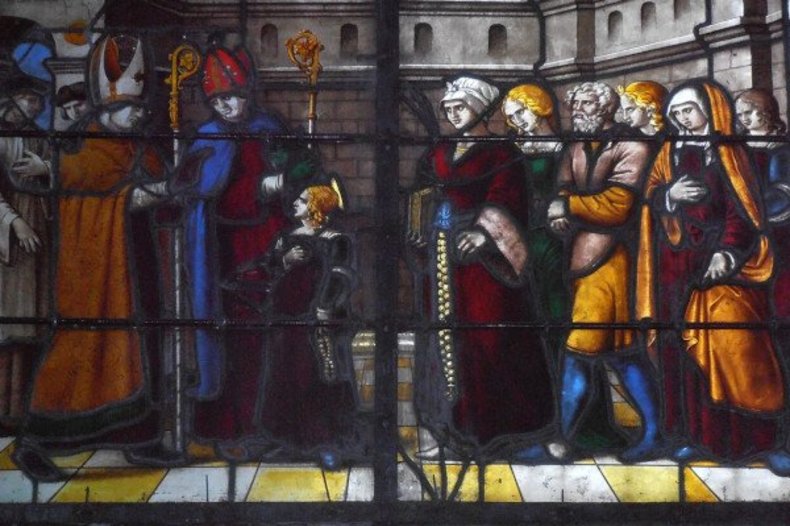
Stained glass window of Saint Genevieve meeting Saint Germain and Saint Loup, Saint-Julien-du-Sault church / © CC BY-SA 3.0 / Convivial94
Les raisons d'y croire :
- The Life of Saint Genevieve, which recounts the meetings between the young girl and the bishop of Auxerre, was undoubtedly written only fifteen years after Genevieve's death in 512, when many witnesses were still alive and could have pointed out errors or exaggerations. Everything it contains is historically coherent and credible.
- Germanus, born in Auxerre around 378, was one of the leading figures of his time. He held high offices, firstly civil and military, then religious, when in 418 he became bishop of Auxerre, which did not prevent him from continuing to exercise command on the battlefield. So he was a rational man who didn't get carried away by dreams.
- The idea of a "set-up" would be absurd. Germanus had never met Genevieve before his visit of Nanterre, and, if he had wanted someone to play a future role to serve his own interests, Genevieve was not the best person to choose: she was much too young, a girl, and of barbarian origin through her father.
- St. Germanus died in Ravenna, Italy, during a visit to the imperial court, on 31 July 448. It is astonishing that, on his deathbed, he should have thought of this young girl whom he barely knew, and decided to send her a token of his esteem and protection. It is also providential that his messenger, who didn't get to Paris to deliver his late bishop's gift to its recipient until two years later, arrived at the very moment when the panicked Parisians, ready to do anything to leave their threatened city, were about to kill Genevieve because she opposed their flight - right on time to save her life.
- By discerning the girl's surprising future, putting her in the spotlight and protecting her, even after her death, Germanus allowed Genevieve to have an impact on the course of history. She succeeded in imposing her views during the Hunnic invasion, putting a definitive stop to the danger posed by these Barbarians.
- Germanus's prophecies came to pass, and his protégée Genevieve became a religious and political figure capable of influencing events and playing a national role, particularly in the conversion of Clovis.
Synthèse :
On his way to Great Britain, Bishop Germanus of Auxerre stopped off at Nanterre and had a revelation about the future holiness of his hosts' daughter. Despite her young age, she was willing to consecrate her virginity to God, and Germanus performed the rite the next day, perhaps giving her the status of deaconess, a female ministry that was specific to the early Church but later disappeared.
After the death of her parents, Genevieve moved to Paristo live with her grandmother. Having inherited her father's position as decurion - the equivalent of a deputy mayor - as the office was hereditary and not elective, she took a seat on the city council, which annoyed many people. In addition, she taught catechism to women and, in possession of the family fortune, distributed it widely in alms. She gathered around her young girls who shared her commitment to the consecrated life. When she fell very ill, she apparently had a near-death experience and visited the afterlife. When she recovered, she dared to report what she had seen, preaching in public and alienating the civil and religious authorities, who reproached her for not keeping to the place reserved for women. In this she was following Germanus's injunction to "Act like a man" ("Age viriliter").
A campaign of slander ensued, but Germanus's unexpected arrival in Paris put a stop to it, as he came to her defence and revealed her sanctity, fasts and penances and announced that the day would come when the city would owe its survival to her. This was the last time that the bishop and Genevieve saw each other in this world, as Germanus died in 448 while travelling to Ravenna, the imperial capital at the time.
On his deathbed, he instructed a priest from his entourage, when he returned to Gaul, to bring Genevieve eulogies, i.e. little gifts he had blessed, to be remembered by. We don't know why the messenger didn't carry out his task until May 451, when Attila's hordes, having pillaged and burnt Metz, laid siege to Orléans and intended to lay siege to Paris, whose inhabitants planned to flee. Genevieve exhorted the population to stay, and instead to fast and pray to the Lord, assuring them that God would protect them, that the Huns would spare the city, and that the fate of Gaul and the West depended on their resistance, as she would give Flavius Aetius time to gather troops and come to their aid. The men refused to believe the woman they called "the Barbarian" - because of her father's origins - and prepared to kill her for trying to convince the women to stay. Just then, Germanus's messenger arrived in Paris and reminded the city leaders of his bishop's prophecy about Genevieve, whom he had said was destined to one day save Paris. The young woman was spared and Attila, who didn't want to waste time besieging such a small town, took another route, proving Genevieve's predictions right. From then on, Genevieve was to exert a decisive influence on the political and strategic choices made by the Parisians.
Anne Bernet, a specialist in Church History, postulator of a cause for beatification and journalist for a number of Catholic media. She is also the author of over forty books, most of them devoted to holiness
Au-delà des raisons d'y croire :
Even though the path to the priesthood was imposed on him rather than a personal choice, Germanus strove to honor God and to become a pious bishop, renouncing his former life and pleasures in order to become holy, to the point where he was credited with several miracles and gifts of prophecy, which he displayed in particular during his meetings with Genevieve.
Aller plus loin :
Life of Saint Germanus of Auxerre by Constantius of Lyons (ca 480 AD)
En savoir plus :- Mgr Louis Prunel, Saint Germain d'Auxerre, Lecoffre, 1929.
- Jean-Pierre Soisson, Saint Germain d'Auxerre, Éditions du Rocher, 2011.
- Anonymous, Vie de sainte Geneviève, 6th century.
- Emmanuel Bourassin, Sainte Geneviève, Éditions du Rocher, 1997.
- Joël Schmidt, Sainte Geneviève et la fin de la Gaule romaine, Perrin, 1987.
- The Diocese of Paris video series on the life of Saint Geneviève, in particular " La vocation de Geneviève ".
LES RAISONS DE LA SEMAINE
Les saints ,
Histoires providentielles

L’intuition surhumaine de saint Pacôme le Grand
Les saints ,
Histoires providentielles

Une main protectrice sauve Jean-Paul II et entraîne des répercussions providentielles
Les apparitions et interventions mariales ,
Histoires providentielles

En 1947, une croisade du rosaire libère l’Autriche des Soviétiques
Les saints ,
Histoires providentielles
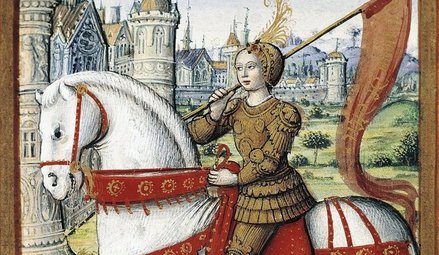
Jeanne d’Arc, « la plus belle histoire du monde »
Les papes ,
Histoires providentielles

La découverte du tombeau de saint Pierre à Rome
Histoires providentielles

La conversion autonome de la Corée
Les papes ,
Histoires providentielles

Le poème prophétique qui annonçait Jean-Paul II
Les saints ,
Histoires providentielles
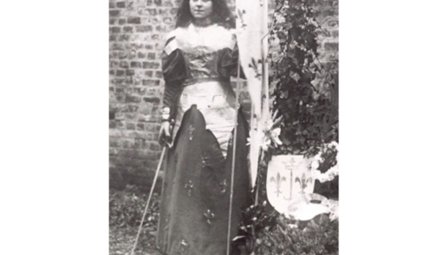
Thérèse de Lisieux, protectrice de ceux qui combattent
Histoires providentielles

Jean de Capistran sauve l’Église et l’Europe
Histoires providentielles

La découverte de Notre-Dame de France par Edmond Fricoteaux
Les apparitions et interventions mariales ,
Histoires providentielles

Un évêque vietnamien tiré de prison par Marie
Les papes ,
Histoires providentielles
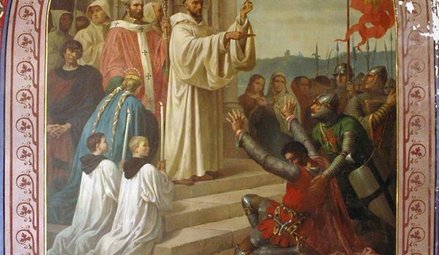
La réconciliation surnaturelle du duc d’Aquitaine
Les saints ,
Histoires providentielles

Et une grande lumière ouvrit la porte de son cachot…
Histoires providentielles

Le lancement des « Vierges pèlerines » dans le monde a été permis par la Providence de Dieu
Les saints ,
Histoires providentielles

Les prédictions et protections de Germain d’Auxerre pour sainte Geneviève
Marie ,
Histoires providentielles

Marie qui défait les nœuds : le cadeau du pape François au monde
Histoires providentielles

Grigio, l’étrange chien de Don Bosco
Histoires providentielles

Julien Maunoir apprend miraculeusement le breton
Les apparitions et interventions mariales ,
Histoires providentielles

Il était censé mourir de froid dans les geôles soviétiques
Les martyrs ,
Histoires providentielles
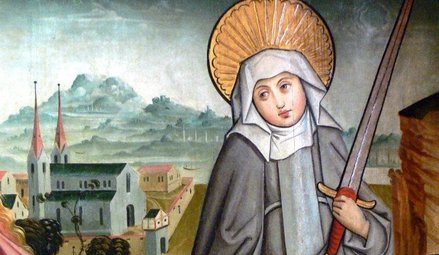
Les miracles de sainte Julienne
Histoires providentielles
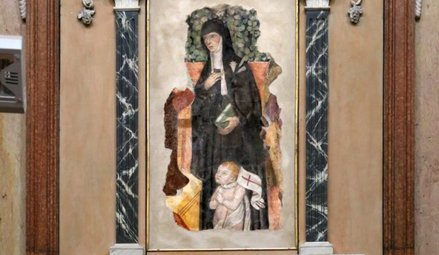
Une musique céleste réconforte Elisabetta Picenardi sur son lit de mort
Histoires providentielles
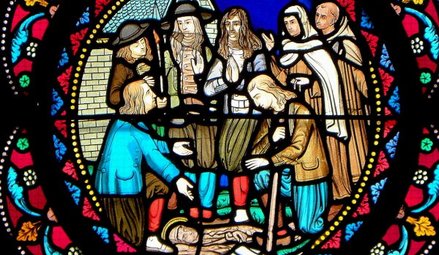
L’étrange aventure d’Yves Nicolazic
Guérisons miraculeuses ,
Histoires providentielles

Un agent secret protégé par Dieu
Histoires providentielles

Un couvent miraculeusement protégé de tous les maux
Les apparitions et interventions mariales ,
Conversions d'athées ,
Histoires providentielles
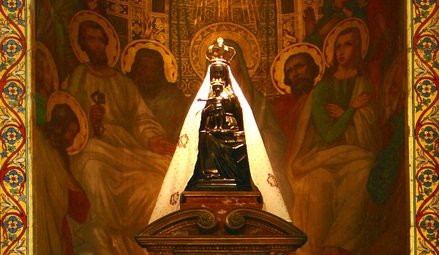
Pierre de Keriolet : avec Marie, nul ne se perd
Les saints ,
Histoires providentielles

La intuición sobrehumana de San Pacomio el Grande
Les saints ,
Histoires providentielles

The superhuman intuition of Saint Pachomius the Great
Les saints ,
Histoires providentielles

A protective hand saved John Paul II and led to happy consequences
Les apparitions et interventions mariales ,
Histoires providentielles

In 1947, a rosary crusade liberated Austria from the Soviets
Les saints ,
Histoires providentielles

Il doute de la Providence : Dieu lui envoie sept étoiles pour éclairer sa route
Les saints ,
Histoires providentielles

Una mano protectora salva a Juan Pablo II y conlleva providenciales repercusiones
Les apparitions et interventions mariales ,
Histoires providentielles

En 1947, una cruzada del rosario liberó a Austria de los soviéticos
Lacrymations et images miraculeuses ,
Histoires providentielles
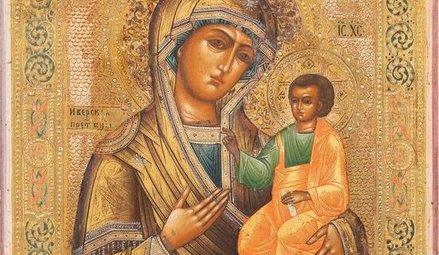
Perdue pendant plus d’un siècle, une icône russe réapparaît
Des miracles étonnants ,
Histoires providentielles

La lave s’arrête aux portes de l’église
Les saints ,
Histoires providentielles

Juana de Arco, "la historia más bella del mundo
Les saints ,
Histoires providentielles
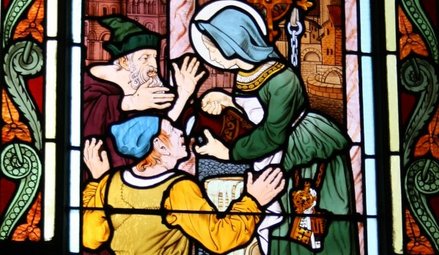
Zita et le miracle du manteau
Les saints ,
Histoires providentielles

L'intuizione sovrumana di San Pacomio il Grande
Les saints ,
Histoires providentielles

Joan of Arc: "the most beautiful story in the world"
Les saints ,
Histoires providentielles

Una mano protettiva ha salvato Giovanni Paolo II con ripercussioni provvidenziali
Les apparitions et interventions mariales ,
Histoires providentielles

Nel 1947, una crociata del rosario ha liberato l'Austria dai sovietici
Histoires providentielles

La découverte providentielle des bâtiments du Centre international Marie de Nazareth
Histoires providentielles

André Bobola prédit la renaissance de la Pologne
Les saints ,
Histoires providentielles

Giovanna d'Arco, "la storia più bella del mondo"
Histoires providentielles

Les flammes purificatrices de Marie-Thérèse de Soubiran
Histoires providentielles
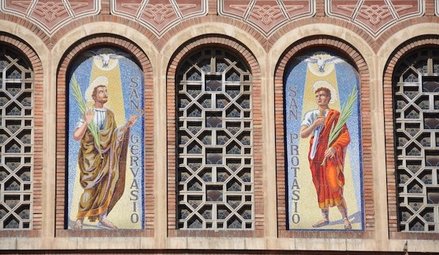
Ambroise de Milan retrouve les corps des martyrs Gervais et Protais
Histoires providentielles

Apt : les reliques de sainte Anne retrouvées par miracle
Les papes ,
Histoires providentielles ,
1000RCInfo

The discovery of Saint Peter's tomb in Rome
Histoires providentielles

Au milieu des ruines, la cellule de Léopold Mandic est intacte
Histoires providentielles
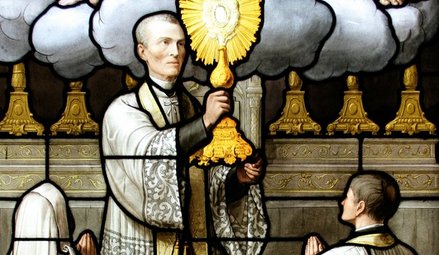
Pierre-Julien Eymard prie et Marie garde le collège
Les papes ,
Histoires providentielles

El descubrimiento de la tumba de San Pedro en Roma
Histoires providentielles

Thérèse de Lisieux sauve de la ruine un carmel italien
Les papes ,
Histoires providentielles

La scoperta della tomba di San Pietro a Roma
Histoires providentielles

Du chemin des vaches à la communauté du Chemin Neuf
Histoires providentielles

Notre Dame de la Clarté sauve sa chapelle bretonne
Histoires providentielles

La couronne de saint Étienne de Hongrie
Histoires providentielles

Conversión autónoma de Corea
Histoires providentielles
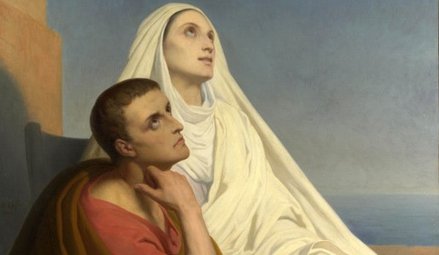
Dieu promet en songe à Monique la conversion de son fils
Histoires providentielles

How Korea evangelized itself
Histoires providentielles

La conversione autonoma della Corea
Histoires providentielles
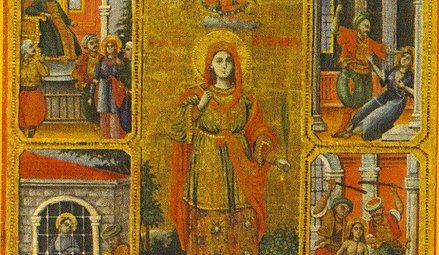
La dépouille de sainte Kyranna miraculeusement retrouvée 250 ans après son martyre
Les papes ,
Histoires providentielles

El poema profético que anunciaba a Juan Pablo II
Les saints ,
Histoires providentielles

Teresa de Lisieux, protectora de los que luchan
Histoires providentielles

Juan de Capistrano salva a la Iglesia y a Europa
Les papes ,
Histoires providentielles

The prophetic poem about John Paul II
Histoires providentielles

L’huile merveilleuse coule à l’abbaye de Bonneval
Les saints ,
Histoires providentielles

Thérèse of Lisieux saved countless soldiers during the Great War
Histoires providentielles

John of Capistrano saves the Church and Europe
Histoires providentielles

Vincent de Paul révèle sa vocation à Catherine Labouré
Les apparitions et interventions mariales ,
Histoires providentielles

Le chapelet et l’officier de la Grande Armée
Histoires providentielles

El descubrimiento de Notre-Dame de France por Edmond Fricoteaux
Les papes ,
Histoires providentielles

Il poema profetico che prefigurava Giovanni Paolo II
Histoires providentielles

Edmond Fricoteaux's providential discovery of the statue of Our Lady of France
Les saints ,
Histoires providentielles

Teresa di Lisieux, protettrice dei combattenti
Histoires providentielles

Giovanni da Capestrano salva la Chiesa e l'Europa
Les papes ,
Histoires providentielles

The supernatural reconciliation of the Duke of Aquitaine
Les apparitions et interventions mariales ,
Histoires providentielles

Mary frees Vietnamese bishop from prison
Les papes ,
Histoires providentielles

La reconciliación sobrenatural del duque de Aquitania
Les apparitions et interventions mariales ,
Histoires providentielles

Marie excarcela a un obispo vietnamita
Histoires providentielles

La Guadalupe espagnole
Histoires providentielles

La scoperta di Notre-Dame de France da parte di Edmond Fricoteaux
Les saints ,
Histoires providentielles

Gury of Kazan: freed from his prison by a "great light"
Histoires providentielles

Global launch of "Pilgrim Virgins" was made possible by God's Providence
Les saints ,
Histoires providentielles

Y una gran luz abrió la puerta de su calabozo...
Histoires providentielles

El lanzamiento de las "Vírgenes Peregrinas" por todo el mundo fue posible gracias a la Providencia de Dios
Histoires providentielles

Saint Martin est sauvé du feu par la prière
Histoires providentielles

Une image de la Vierge Marie à l’épreuve des bombes
Les papes ,
Histoires providentielles

La riconciliazione soprannaturale del duca d'Aquitania
Les apparitions et interventions mariales ,
Histoires providentielles

Un vescovo vietnamita liberato dal carcere da Maria
Histoires providentielles

Jésus retarde le décès de Lizzie
Les saints ,
Histoires providentielles

Germanus of Auxerre's prophecy about Saint Genevieve's future mission, and protection of the young woman
Les saints ,
Histoires providentielles

Predicciones y protecciones de Germain d'Auxerre para Saint Geneviève
Marie ,
Histoires providentielles ,
_TopNL

María, la que desata los nudos: el regalo del Papa Francisco al mundo
Marie ,
Histoires providentielles

Mary Undoer of Knots: Pope Francis' gift to the world
Les saints ,
Histoires providentielles

E una grande luce aprì la porta della sua prigione...
Histoires providentielles

Il lancio delle "Vergini pellegrine" in tutto il mondo è stato reso possibile dalla Provvidenza di Dio
Histoires providentielles

Saint Géraud et le miracle des fruits à Braga
Les saints ,
Histoires providentielles

I pronostici di Germano d'Auxerre e la protezione di Santa Genoveffa
Marie ,
Histoires providentielles

Maria che scioglie i nodi: il dono di Papa Francesco al mondo
Les saints ,
Histoires providentielles

Jeanne de Chantal et François de Sales : une rencontre préparée par Dieu
Histoires providentielles

Don Bosco's angel dog: Grigio
Histoires providentielles
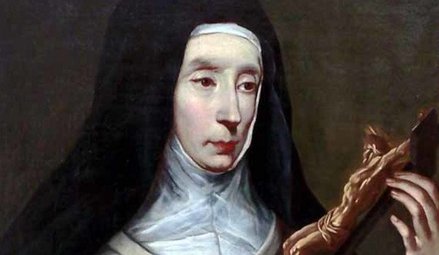
La prière de sœur Marie des Anges sauve deux fois Turin
Histoires providentielles

Grigio, el extraño perro de Don Bosco
Histoires providentielles

Grigio, lo strano cane di Don Bosco
Histoires providentielles

Julien Maunoir miraculously learns Breton
Histoires providentielles

Julien Maunoir impara miracolosamente il bretone
Les apparitions et interventions mariales ,
Histoires providentielles

He should have died of hypothermia in Soviet jails
Histoires providentielles

Julian Maunoir aprende bretón milagrosamente
Les martyrs ,
Histoires providentielles

The miracles of Saint Juliana of Nicomedia
Histoires providentielles

Heavenly music comforts Elisabetta Picenardi on her deathbed
Les apparitions et interventions mariales ,
Histoires providentielles

Avrebbe dovuto morire di freddo nelle carceri sovietiche
Les apparitions et interventions mariales ,
Histoires providentielles

Se suponía que iba a morir congelado en las cárceles soviéticas
Les martyrs ,
Histoires providentielles

I miracoli di Santa Giuliana
Les martyrs ,
Histoires providentielles

Los milagros de Santa Juliana
Histoires providentielles

Una música celestial consuela a Elisabetta Picenardi en su lecho de muerte
Histoires providentielles

Una musica celestiale conforta Elisabetta Picenardi sul letto di morte
Histoires providentielles

The strange adventure of Yves Nicolazic
Guérisons miraculeuses ,
Histoires providentielles

God protects a secret agent
Histoires providentielles

La extraña aventura de Yves Nicolazic
Guérisons miraculeuses ,
Histoires providentielles

Un agente secreto protegido por Dios
Histoires providentielles

Un convento milagrosamente protegido de todos los males
Les apparitions et interventions mariales ,
Conversions d'athées ,
Histoires providentielles

Pierre de Keriolet: con María, nadie se pierde
Histoires providentielles
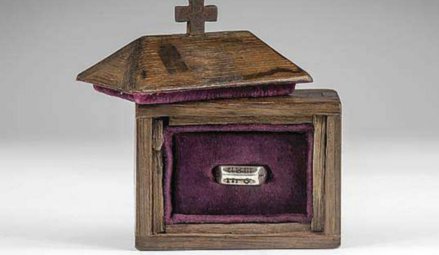
Retour de l’anneau de Jeanne d’Arc en France : une affaire providentielle
Histoires providentielles

La strana avventura di Yves Nicolazic
Guérisons miraculeuses ,
Histoires providentielles

Un agente segreto protetto da Dio
Les saints ,
Histoires providentielles

Duda de la Providencia: Dios le envía siete estrellas para iluminar su camino
Histoires providentielles

Syrian monastery shielded from danger multiple times
Les apparitions et interventions mariales ,
Conversions d'athées ,
Histoires providentielles

Pierre de Keriolet: with Mary, one cannot be lost
Lacrymations et images miraculeuses ,
Histoires providentielles

Reaparece un icono ruso perdido durante más de un siglo
Les saints ,
Histoires providentielles

Seven golden stars reveal the future location of the Grande Chartreuse Monastery
Lacrymations et images miraculeuses ,
Histoires providentielles

Lost for over a century, a Russian icon reappears
L’Église ,
Histoires providentielles
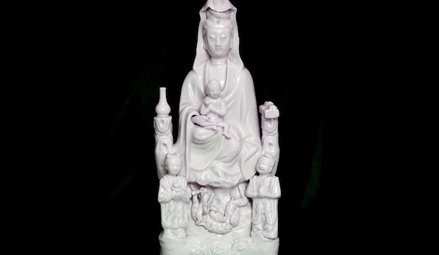
Le miracle de la transmission de la foi dans l’Église cachée japonaise
Des miracles étonnants ,
Histoires providentielles

Flowing lava stops at church doors
Histoires providentielles

Un convento miracolosamente protetto da ogni male
Les apparitions et interventions mariales ,
Conversions d'athées ,
Histoires providentielles

Pierre de Keriolet: con Maria non si perde nessuno
Des miracles étonnants ,
Histoires providentielles

La lava se detiene a las puertas de la iglesia
Les saints ,
Histoires providentielles

Dubita della Provvidenza e Dio gli manda sette stelle per illuminare il suo cammino
Lacrymations et images miraculeuses ,
Histoires providentielles

Persa da più di un secolo, riappare un'icona russa
Des miracles étonnants ,
Histoires providentielles

La lava si ferma alle porte della chiesa
Histoires providentielles








